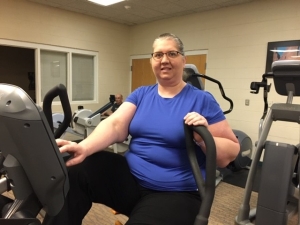
Angela Horton, 44, was feeling run down. But she thought she may need to
see a doctor after having to call her mom to help her stay awake one evening
while she drove home from work. She wondered if a poor diet and lack of
exercise may be why she was feeling so tired.
As she put on weight and started having difficulty breathing, her co-workers
pulled her aside and suggested she take some time off. After seeing a
doctor, Angela found out that sleep apnea – a condition she had
heard doctors discuss with patients for years during her career as a heart
technologist – may be the problem. But It wasn’t until she
was diagnosed with heart failure that she began to understand the toll
sleep apnea had taken on her body. While she was sleeping she was starved
for oxygen, which took a toll on her heart.
One day last summer when she arrived at work feeling very tired and short
of breath, she had an EKG taken. The results were alarming. The condition
was thought to be v tach – a fast, abnormal heart rate – and
a defibrillator was brought in, which is used for emergency heart conditions.
It was then that Angela knew her condition was serious, and she was admitted
to Catawba Valley Medical Center. “It was a shock to find out my
heart was in such bad shape that I needed to be admitted to the hospital,”
said Angela. “But the health providers who cared for me worked together
as a team to help me feel better within a few days.”
As she began to recover, she was encouraged to change her diet and join
Catawba Valley Medical Center’s
Cardiac Rehabilitation Program at
Fitness Plus, the CVHS fitness center. Making the commitment to work out was hard at
first, but the physical therapists and Fitness Plus team inspired her
to soldier on throughout her exercise routines.
Angela has been working in the Catawba Valley Medical Center heart catheterization
lab for more than 20 years and was eager to get back to caring for her
patients. “As I watched the sunrise at the fitness center during
one morning workout, I overheard a friend telling the staff that he works
out so he can stay out of there – pointing to the hospital. It was
then I thought to myself, I will work hard so I
can get back there and start caring for my patients again.”
Angela also signed up for Catawba Valley Health System’s quarterly
Heart Failure Support Group. “I am so grateful to have the help of Sarah Paul, the nurse practitioner
who leads the
Heart Failure Clinic and support group,” she said. “With her help I am learning
how to successfully manage my lifestyle to help me stay well.”
That support group, whose theme is “Turning Failure Into Success,” meets the first Tuesday of every third month, from 5:30pm to 6:30pm
at the CVHS
Health First Center. It helps patients successfully manage lifestyle changes to promote better
living with heart failure, and it is free for all of those living with
heart failure, their family members and caregivers.
Committed to high quality and superior outcomes, Catawba Valley Health
System provides specialized clinical experience throughout the full continuum
of care from diagnosis to treatment, rehabilitation and ongoing support.
The CVHS healthcare team is dedicated to caring for patients with skill
and compassion and delivers a team-oriented approach to help its patients
along their journey to better health.